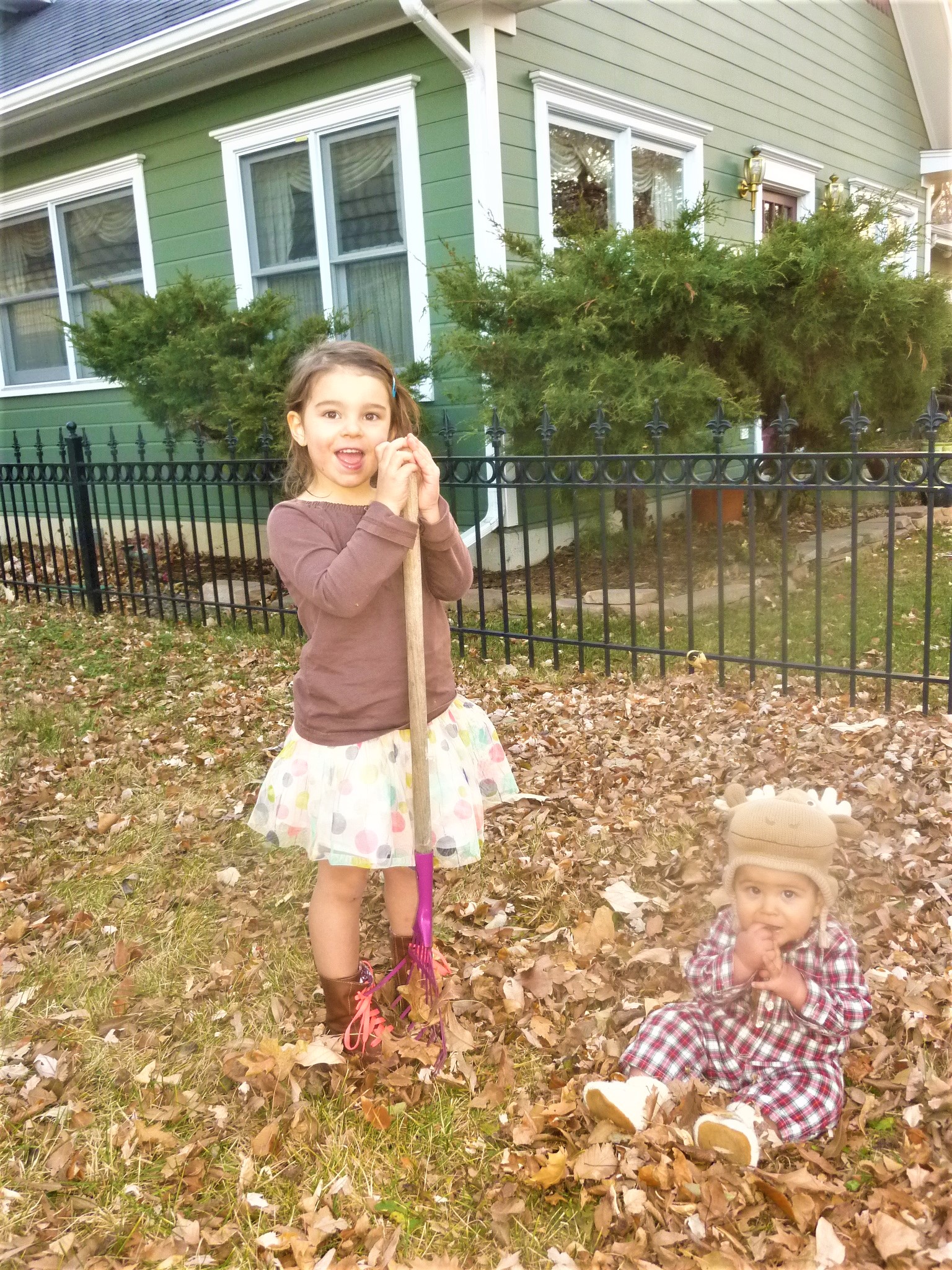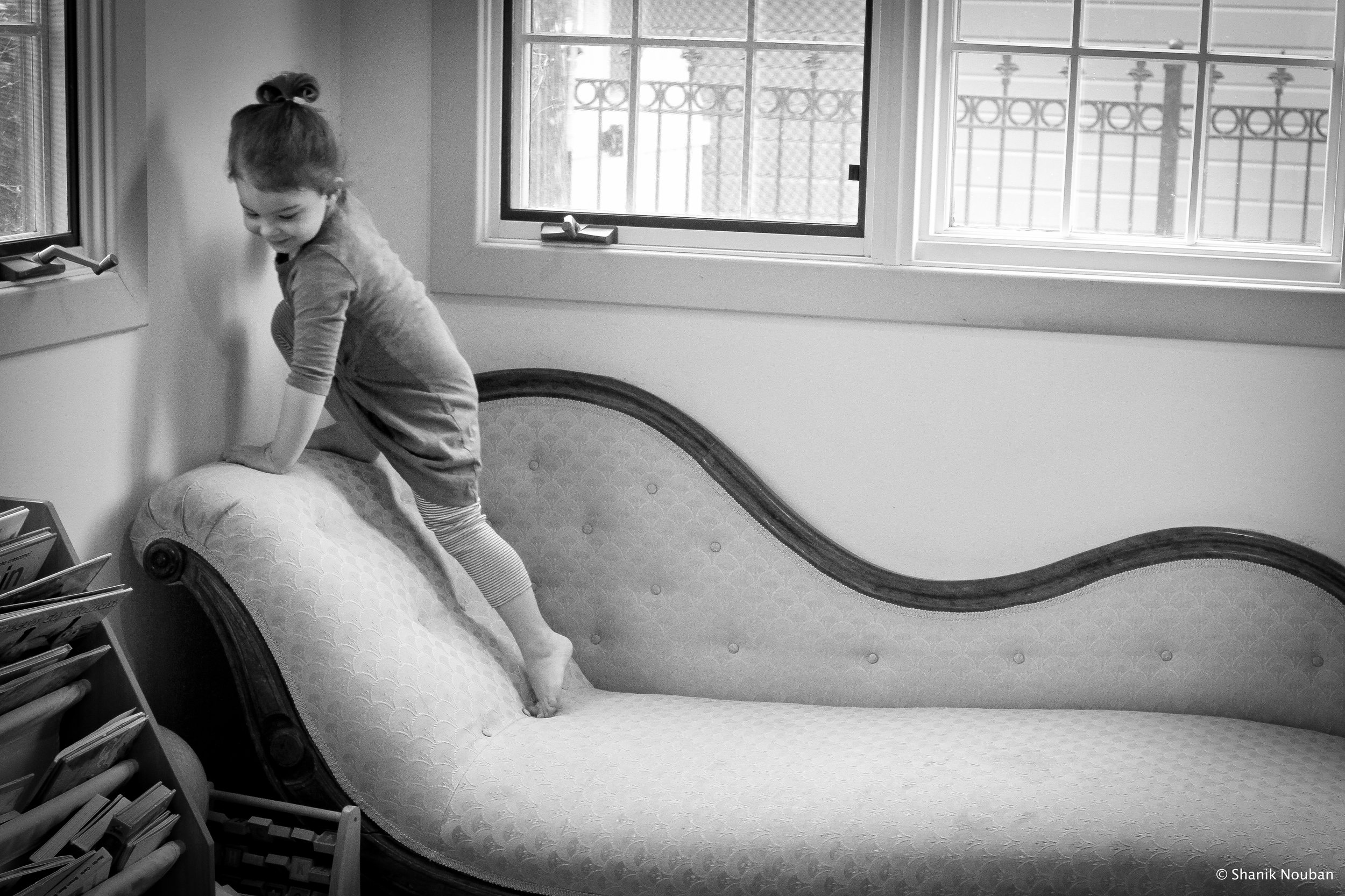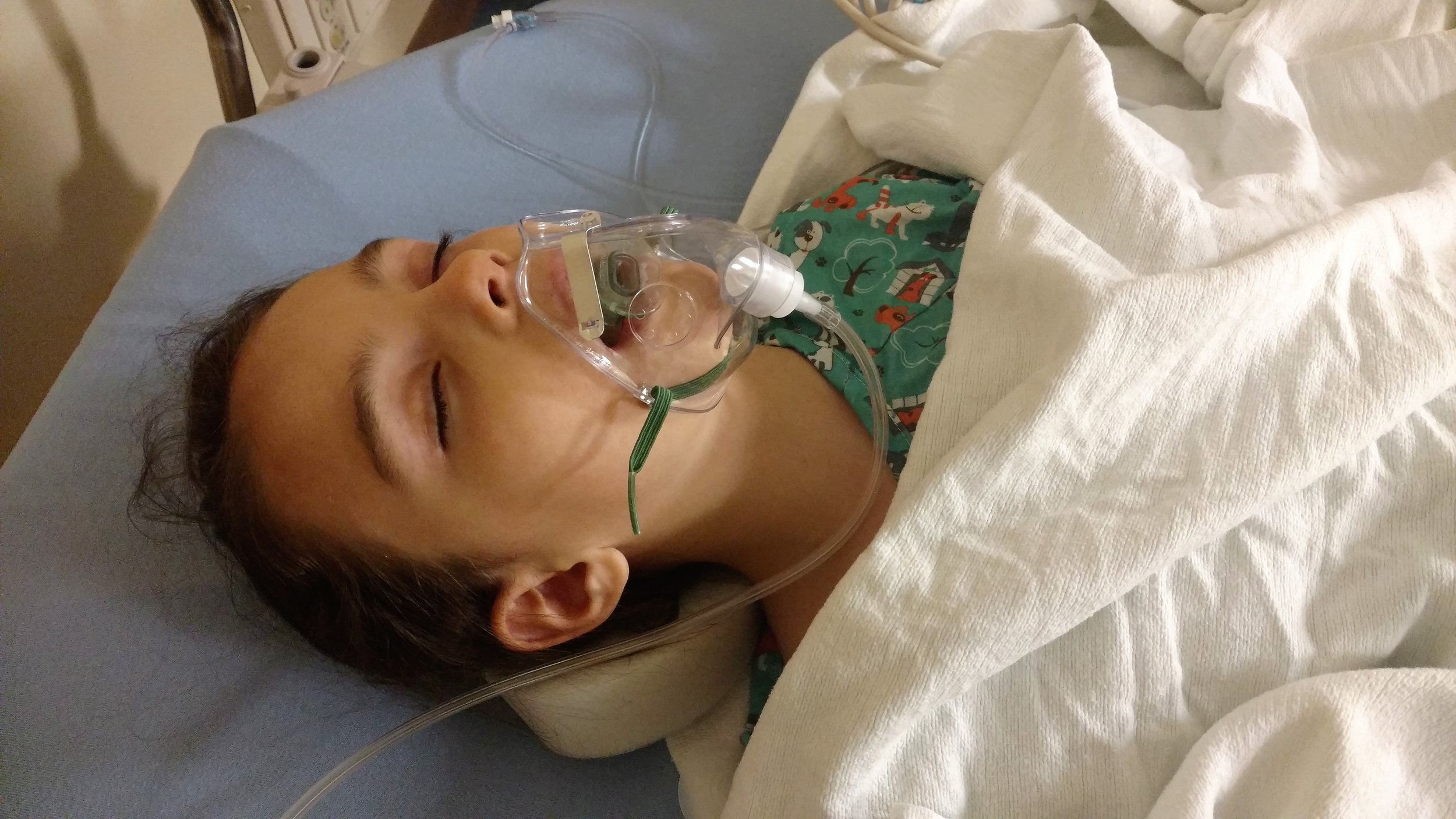It was a snowy January day in Boston, the start of 2018. We had just arrived from Colorado a few days earlier. The sky was gray and the temperature was getting colder. Snow pushed up against sidewalks and cars. Our rental house with its steeply pointed roof covered in large old shingles sat on a quiet side street, with snow piled around it. I had looked for a spot to live where Mila could get outside and push her stroller without the city sounds of honking cars and sirens overwhelming her. Every day, I hoped to receive the call that her treatment was approved, as her strength was rapidly giving out and I fought to keep her up and moving.
Since arriving, we had tried to keep up our daily walking routine from home. I would lie Mila down on the living room floor, her head resting on a pillow. I helped her arms through the sleeves of her blue down jacket and pulled her legs through the fleece-lined pants. I opened her gloves wide enough to help her hands into them, directing as many fingers in the right places as possible. I lifted her head off the pillow and pulled her hat on, tucking her hair behind her ears. I opened her velcro sneakers as wide as possible and maneuvered her feet into place. Then I would bend down and lift her up onto her feet. I would switch positions, holding Mila from behind, and we would walk to the sofa one step at a time. I sat her down, positioned with pillows on either side, and propped open the front door. The frigid Boston air rushed in. I pushed the stroller down the steps and dressed Azlan and then myself.
I would walk Mila out the door and carefully down the steps. My hands were on Mila, but my attention was always on Azlan as he ran ahead, no way for me to grab him if I needed to. I lifted Mila’s gloved hands onto the padded bar of her stroller and helped her fingers grasp on. Her hands would slip and drop down by her side. I would try again, placing my hands on top of hers, her fingers loosely gripping the bar. Azlan would jump into the stroller, pushing it back against us. The weight helped keep the front wheels down, and Azlan got the chance to ride for a change. Mila and I would start to push, together. She would lift one leg at a time, slowly moving her body forward. With each step, her toes grazed the ground. Left. Right. Left. Right. Her new blue shoes sparkled against the white snow.
The houses in our new neighborhood were separated by large yards. After ten minutes of walking, stopping often to rest Mila’s legs, we would make it just past the house next door. We would aim for a tree in the next yard, then turn around and make our way back to our house. I would get the kids inside, pull the stroller up the steps and take off everyone’s jackets, pants, boots, hats and gloves. It always seemed like so much work for such a short walk. But those thoughts would only pull me down, so I would rally and try to keep our spirits high. I transformed our mundane walks into adventures of Anna from Frozen trudging through the snow to her sister’s castle, or a family of hedgehogs making their way to a party in the forest. The stories came easily. My love of fantastical tales began when Mila was just a baby. But keeping my energy up every day became increasingly difficult as the exhausting year behind me caught up with me.
On this particular day in January of 2018, we were slowly walking down the sidewalk when Mila stumbled. My arms under hers, I pulled her up onto her feet, just as an older woman with white wavy hair and a striking orange and blue silk scarf around her neck walked down the path from her house. She stopped and smiled. Looking down at Mila, she paused. Her eyes, now wet with tears, lifted and looked into mine. “I understand,” she said.
“What does your daughter suffer from?” she went on to ask. “Batten disease. A rare neurological condition,” I responded. I explained that we had just moved to Boston for an experimental genetic treatment. Mila’s legs were beginning to buckle and give out. Her body and head were starting to slump. Her hands no longer grasped the bar of the stroller like before. Every day, we walked to the tree in her yard to keep Mila strong.
The woman was beautifully elegant, with high cheekbones, pearl earrings, noticeable eyeshadow and bright salmon-colored lipstick. She spoke with a thick French accent. She bent down and leaned close to Mila’s face asking her name. “Mila,” I responded. Tears again welled in the woman’s eyes. “Mila,” she paused. “What a beautiful name. You know, Mila, I had a daughter like you and we would come outside and she would ride her bike around these streets.” She continued to speak directly to Mila, something people rarely did anymore.
We walked the streets of her neighborhood, under the tall canopies of trees covered in snow. She told us that she had lived in Europe with her family until her seven-year-old daughter, the same age as Mila, had started to have problems with walking, then talking. For years no doctor could figure out what was wrong. So she and her husband decided to move their family across the ocean to be near Boston Children’s Hospital in hopes that doctors there could help figure out what was happening to their previously normal daughter. Amazingly, they pinpointed the culprit, a genetic disease called Ataxia Telangiectasia, or A-T. Unfortunately, this was in the 1970s and there was little known about genetic disease. But this mother wouldn’t give up. She fought to find ways to help her daughter interact with the world around her, even as her disease progressed. Her little girl was smart and wanted to learn, but engaging became increasingly challenging for her. Her hands shook, her vision blurred, and her speech slurred. With no resource guide for children with A-T, her mother enlisted therapists at the Perkins School for the Blind and Boston Children’s Hospital. She found devices that helped with reading.
Eventually, her daughter lost the ability to walk. They rearranged the furniture in their house, pushed carpets to the side and added an electric chair that moved up and down the staircase. They left one wheelchair at the bottom, another at the top.
As we continued to walk through the neighborhood, we came across a place where the roots of a towering old tree had pushed their way up through the sidewalk. The flat surface buckled, making it nearly impossible for Mila’s stroller to make it to the other side. The woman stopped. “You know, Mila, this is the place where my daughter fell off her bike when she was little.” Her wide smile lifted her cheek bones. “She got going so fast and then she fell just right here where the tree roots spread.” Her wet eyes continued to shine. She let out a laugh, and then seemed to quietly think back on that moment forty years ago. The move to Boston was supposed to be temporary, she said. They never made a decision to call Boston their home. It just happened.
Up until that day, I had felt surrounded by a community. But as I walked alongside this woman, I realized in many ways I had been completely alone. The deep aching pain of thinking I would lose Mila travelled with me everywhere I went. It was part of me. And it was something even the closest people in my life could never truly feel. Now, here I was, walking with a woman I had never met before, who knew this feeling. She had lived this feeling. And it would be with her forever. We had both moved to Boston with a desperate hope that something could be done to save our seven-year-old daughters. We reached out to the same hospital where genetics and medicine was being pushed to the cutting-edge. We both fought alongside our daughters. And we struggled to allow our sons a childhood.
Over the following months, this woman became a part of our life. She came to our house with a record player under her arm, singing along to the French songs she used to play for her children. She clapped her hands to the rhythm, bringing smiles and laughter to Mila and Azlan. She left hand-written cards at our doorstep wishing Mila well on her treatments. And she pulled a painted wooden doll bed out of her daughter’s closet and gave it to Mila. We would stop to say hello on our walks, occasionally invited in to have cookies and tea. Her house was frozen in time. I imagined the furniture, the kitchen, the bathrooms to be just as they were when she lost her daughter, and soon after, her husband. She had been a mother in her late ‘40s, not much older than me, left alone with her son.
I looked around the living room at the photos of her and her husband and their two children in France and Germany. Through the images, I watched them grow. She stopped and picked up a photo of her daughter, smiling at the beach. It was from the waist up, no sign of her wheelchair. Strands of brown hair blew across her face from the Nantucket wind. A sweatshirt kept her warm. A wide smile radiated love, life. This photo was her favorite, the woman told me. It was the last one taken before she said goodbye to her daughter forever.
This home, these photos, the stories were of this woman’s life. But it could have been mine. Perhaps I saw my own future in her? Or was it a fascination with how life somehow continued? Either way, her smile gave me strength and hope for an unknown future that lay ahead.
Forty years ago, this woman’s fight allowed her to find the answer to what was happening to her daughter. A cure was only a distant dream. But she gained peace of mind. Now, my fight allowed the answer to Mila’s symptoms to be translated into a treatment. I closed my eyes and imagined a day ten years down the road. A day when a young mother congratulated her seven-year-old daughter for independently pushing her baby brother in a stroller. This mom would tell me that her daughter had been diagnosed at birth with a fatal genetic disease, but the doctors at Boston Children’s Hospital had stopped the progression with a treatment like Mila’s before symptoms even began. This family was allowed a life without the pain and suffering that those before her had endured.
Something inside of me shifted the day I crossed paths with this woman. Our stories ran so close. We shared a life of desperation and relief, of pain and love, of weakness and strength. A life of daughters and sons. Of rare disease. Sometimes, I wonder whether this woman understood what a beautiful gift she gave me - the realization that we were alone, together.
























